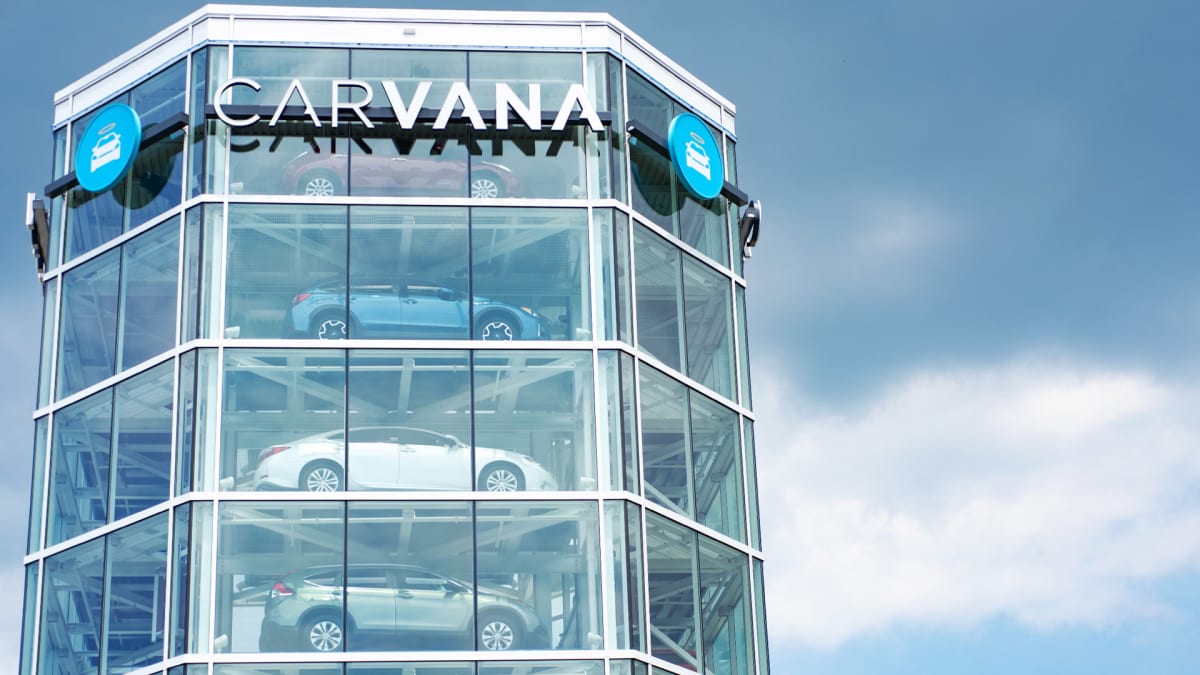
It's been a very eventful start to the year for Carvana shareholders.
'The Amazon of used cars' has been experiencing a stock market frenzy since the beginning of the year.
Carvana shares ended the year on Dec. 30 at $4.74. The decline was around 97% over the whole year. Basically, the year 2022 had been a real drain for shareholders of the firm which aims to change the way we buy and sell cars.
As a result, it's no surprise that speculations about the company's bankruptcy were rife at the end of last year. The question, some experts said at the time, was to know when Carvana (CVNA), whose debt is important, was going to decide to file for Chapter 11 bankruptcy and not if the company was going to go bankrupt.
The company's market valuation was barely at $842 million on Dec. 30, compared to almost $21 billion a year earlier. More than $20 billion of market value had been wiped out in 12 months.
A little over a month later Carvana has picked up the colors again. The group seems to be reborn from its ashes on the stock market. The company has earned almost $2 billion in market value, currently at $2.6 billion.
Fundamentals Aren't Behind the Euphoria
We are certainly still far from the levels of 2021, but the Carvana figures for this start of the year are frightening. The stock has soared 205% this year. In the last trading week, Carvana saw its stock prices jump to $14.45 on Feb. 3 from $7.77 on Jan. 27. This jump represents an increase of 86% in five trading sessions.
These good figures, which somewhat heal shareholders' wounds, could suggest that the group's problems are being resolved. But in fact when you look closely it is not the case. The company, which will publish its earnings for the fourth quarter of 2022 on Feb. 23, has still not made any spectacular announcements to allay concerns about its future.
The company is Amazon's counterpart in the automotive industry.
During the covid-19 pandemic, it had become the place where consumers went to buy or sell a used vehicle. The company's business model was in perfect symbiosis with an economy that had moved online due to the restrictions to limit the spread of the pandemic.
The most symbolic of this emergence of Carvana was the company's giant vending machines, present in more than 25 American cities.
The problem is that the Tempe, Ariz.-based company didn't seem to have anticipated headwinds: the downturn in the used car market, in particular, a possible recession and a sudden rise in interest rates, which would make car loan financing expensive, represent a normalization of the automotive market.
Many car manufacturers such as Tesla (TSLA) and Ford (F), for example, have recently reduced their prices, going so far as to offer large discounts to consumers, a sign that the supply of new cars is greater than demand. Faced with attractive new offers or promotions, it is logical to consider that consumers will abandon the second-hand market.
All this is the opposite of what was happening during the pandemic: at the time, the shortage of chips had a big impact on the inventories of car manufacturers which could not produce as much as they wanted. On the demand side, consumers who wanted to avoid public transit and any crowded mode of transport would switch to the purchase of a vehicle as long as the money was available. The federal government had flooded the economy with stimulus in the form of checks to households.
All of this resulted in a spike in used car prices. In 2021, the second-hand car market posted a record 41% increase. Now, not only has the company sold fewer cars, but it has also seen the value of the cars in its inventory decrease. Carvana's model is based on the fact that the company must sell more used vehicles than it buys.
Return of the Reddit Trader
Given that all these problems remain, the recent stock market euphoria should therefore be looked at elsewhere.
"Carvana is on an epic short squeeze today," Genevieve Roch-Decter, CFA, a former small cap money manager, explained on Twitter. "Short interest is 65%."
A 'short squeeze' is a sudden surge in the price of an asset due to the fact that investors who bet against the asset are forced to purchase it in order to limit their losses. This phenomenon has spread in recent days around the meme stocks that were decimated last year.
The main reason behind the rally is due to expectations of a less worrisome macroeconomic scenario for stocks in general. Hopes for a soft landing of the global economy were reinforced earlier this year when inflation peaked.
This provides some relief for assets most impacted by a high-interest-rate scenario — especially growth and speculative stocks.
Carvana, whose fundamentals do not explain its rebound, is therefore now part of the meme stocks, a phenomenon which appeared back in 2021 when retail investors piled into shares of GameStop (GME) in an attempt to punish short sellers. Meme stocks trade in unusual ways, compared to "regular" stocks.
The recent rallies of meme stocks and other stocks with similar profiles show that socially mobilized investing, even though bruised by last year's losses, is still alive. These investors supporting the meme stocks are most often mobilizing on the Reddit social network.
Besides GameStop, AMC Entertainment (AMC), and Bed Bath & Beyond (BBBY) are also considered as meme stocks. It is also the case for stocks of companies related to cryptocurrencies such as Coinbase (COIN) and MicroStrategy (MSTR).







